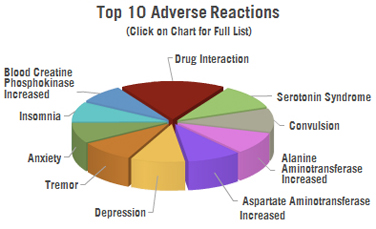Fluvoxamine (Luvox) is a serotonin reuptake inhibitor, which means that it helps to increase the amount of serotonin in your brain. It is prescribed for people who suffer from obsessive-compulsive disorder and social anxiety disorder.
There are many things you need to know before taking fluvoxamine, including what medications should not be taken with it, how long does it take for fluvoxamine to work, and what risks there are if you take fluvoxamine for an extended period.
Contents
- 1 What Is Fluvoxamine (Luvox)?
- 1.1 What Does It Treat?
- 1.2 What Should I Discuss With My Doctor Before Taking Fluvoxamine (Luvox)?
- 1.3 How Should I Take Fluvoxamine (Luvox)?
- 1.4 What Happens If I Miss A Dose Of Fluvoxamine (Luvox)?
- 1.5 What Should I Avoid While Taking Fluvoxamine (Luvox)?
- 1.6 What Happens If I Overdose With Fluvoxamine (Luvox)?
- 2 Important Information I Should Know About Fluvoxamine (Luvox)
- 3 Possible Side Effects Of Fluvoxamine (Luvox)
- 4 Risks For Taking Fluvoxamine (Luvox) For Long Periods Of Time
- 5 Other Medications May Interact With Fluvoxamine (Luvox)
- 6 How Long Does It Take For Fluvoxamine (Luvox) To Work
- 7 Conclusion
What Is Fluvoxamine (Luvox)?

Fluvoxamine is a prescription medication that belongs to the class of medications called selective serotonin reuptake inhibitors (SSRIs).
What Does It Treat?
Fluvoxamine is used to treat adults with obsessive-compulsive disorder (OCD), panic disorder, and social anxiety disorder. Fluvoxamine can also help relieve symptoms of panic disorder. It may also be used to treat other conditions as determined by your doctor.
What Should I Discuss With My Doctor Before Taking Fluvoxamine (Luvox)?
Before taking fluvoxamine, you must discuss all of your medical conditions and medications (including prescription drugs, nonprescription drugs, and herbal supplements) with your doctor.
You may need to be monitored closely by your doctor while taking fluvoxamine if you have any of the conditions listed below:
- Myasthenia gravis (a condition that weakens the muscles)
- High blood pressure or heart problems
- Kidney disease, liver disease, or history of seizures
- Severe allergies
Before taking fluvoxamine, tell your doctor if you:
- Have any other medical conditions
- Are pregnant or plan to become pregnant
- Have a history of seizures
- Are breastfeeding
- Are allergic to fluvoxamine or any other medications
How Should I Take Fluvoxamine (Luvox)?
Fluvoxamine should be taken exactly as prescribed by your doctor. Your dose will depend on your condition and how you respond to treatment.
Follow the directions on your prescription label carefully, and ask your doctor to explain any part you do not understand.
A few things to keep in mind:
- Do not take more or less fluvoxamine than prescribed.
- Fluvoxamine may be taken with or without food.
- Swallow fluvoxamine tablets whole; do not chew, crush, or dissolve them
NOTE: The dose of fluvoxamine may need to be changed if you take other medications. Do not change the dose of your medication or stop taking fluvoxamine without first talking to your doctor.
What Happens If I Miss A Dose Of Fluvoxamine (Luvox)?
If you miss a dose of fluvoxamine, take it as soon as possible. If it is almost time for your next dose, skip the missed dose and go back to your regular dosing schedule.
NOTE: Do not take extra medicine to make up for the missed dose.
What Should I Avoid While Taking Fluvoxamine (Luvox)?
Fluvoxamine can cause side effects that may impair your thinking or reactions.
- Be careful if you drive or do anything that requires you to be alert and able to think clearly.
- Limit alcoholic beverages while taking fluvoxamine, as they may increase your risk of liver damage.
What Happens If I Overdose With Fluvoxamine (Luvox)?
If you overdose on fluvoxamine, call your doctor or poison control center right away.
Symptoms of fluvoxamine overdose may include:

- Coma;
- Confusion;
- Fast heartbeat;
- Fever or sweating;
- Severe drowsiness;
- Tremor (shakiness);
- Difficulty breathing and swallowing
NOTE: Symptoms may vary depending on the amount taken. Those listed above are most often the symptoms of a mild overdose.
Important Information I Should Know About Fluvoxamine (Luvox)
Before taking fluvoxamine, you must discuss all of your medical conditions and medications with your doctor. Fluvoxamine can cause serious side effects, including serotonin syndrome, which may be life-threatening. Your doctor will monitor you closely for this side effect while taking fluvoxamine.
Serotonin Syndrome
Serotonin syndrome is a potentially life-threatening condition that can occur when taking certain medications, including fluvoxamine. Symptoms of serotonin syndrome may include:
- Confusion
- Agitation
- Restlessness
- Hallucinations
- Fever
- Sweating
Specific Concerns About Fluvoxamine (Luvox) And Pregnancy
Fluvoxamine has not been studied in pregnant women. It is unknown if fluvoxamine may harm an unborn baby, so it must be used during pregnancy only when prescribed by your doctor.
NOTE: Fluvoxamine should not be used by pregnant women or women who are breastfeeding.
Possible Side Effects Of Fluvoxamine (Luvox)
Common Side Effects
If you experience any of these possible side effects, call your doctor immediately:

- Abdominal pain and cramps;
- Agitation; anxiety;
- Blurred vision or double vision;
- Burning in mouth/throat;
- Constipation (severe);
- Decreased appetite;
- Diarrhea (severe);
- Dizziness;
- Dry mouth;
- Flu-like symptoms;
- Headache (severe);
- Increased sweating;
- Irritability;
- Nausea and vomiting (severe);
- Nervousness; restlessness;
- Sexual dysfunction includes decreased libido, delayed ejaculation, or erectile dysfunction
Severe Side Effects
In some cases, people taking fluvoxamine may experience more severe side effects. If you experience any of these symptoms, call your doctor right away:
- Hallucinations;
- Mania (extreme excitement or irritability);
- Seizures;
- Suicidal thoughts or behaviors
NOTE: Fluvoxamine may also cause other side effects not listed here.
Risks For Taking Fluvoxamine (Luvox) For Long Periods Of Time
Some people who take fluvoxamine for long periods may experience some decrease in its effectiveness. If this happens, your doctor may need to change your dosage or prescribe a new medication.
Other Medications May Interact With Fluvoxamine (Luvox)
Fluvoxamine should not be taken with the following medications without first talking to your doctor:
- Ibuprofen (Motrin, Advil)
- Warfarin (Coumadin)
- Clozapine (Clozaril)
- Trazodone (Desyrel)
- Linezolid (Zyvox)
How Long Does It Take For Fluvoxamine (Luvox) To Work
It usually takes a few weeks for fluvoxamine to start working. However, it is important to continue taking the medication as prescribed by your doctor even if you feel better.
NOTE: It is important to take fluvoxamine regularly to get the most benefit.
Conclusion
If you have been diagnosed with obsessive-compulsive disorder (OCD), or are experiencing symptoms of OCD, talk with your doctor about treatment options.
Fluvoxamine is one medication that has helped thousands of people suffering from mental health disorders like OCD find relief and begin their road to recovery.
If you are pregnant or thinking about becoming pregnant while taking fluvoxamine, be sure to tell your physician so they can help ensure that you are taking the lowest effective dose.
Also, fluvoxamine is an SSRI which means it has risks for drug interactions and side effects. So be sure to talk with your doctor about any other medications or supplements you take before starting treatment.
If you are looking for affordable Online Counseling MantraCare can help: Book a trial therapy session


